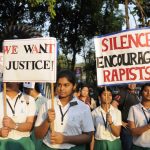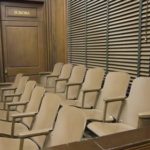Religious Exemption Laws: An Interview With Professor Marion Maddox

Philip Ruddock’s inquiry into whether Australian laws adequately protect religious freedoms began last Wednesday. Malcolm Turnbull announced the controversial review in late November, in response to the concerns of his colleagues and ‘No’ voters over same-sex marriage laws.
The expert panel assisting Ruddock with his inquiry comprises Australian Human Rights Commission president Rosalind Croucher, Jesuit priest Frank Brennan, former federal court judge Annabelle Bennett, and constitutional law professor Nicholas Aroney.
And although the marriage equality debate that prompted the review, there’s no representation of the LGBTIQ community on the panel.
Australian treasurer Scott Morrison told Fairfax Media late last year that he’ll be pushing for further protections for religious freedoms in the law this year. The religious conservative went on to explain the changes will be informed by the Ruddock inquiry.
The right to discriminate
However, the Ruddock review is not the only religious freedoms inquiry underway. The joint Senate Standing Committee and Human Rights Subcommittee inquiry into the status of the human right to freedom of religion or belief was established back in November 2016.
Its interim report explains that infringements upon religious freedoms aren’t due to the “dominance of one religion over others.” Rather, state anti-discrimination are the main source of the problem, as they don’t allow for the “lawful differentiation of treatment by religious individuals and organisations.”
The report goes on to state that while existing religious exemptions within anti-discrimination laws, such as the Sex Discrimination Act, “provide some protection,” they don’t “acknowledge the fundamental position that freedom of religion has in international human rights law.”
This means current religious exemptions don’t allow religious individuals to treat others, whose belief systems they don’t agree with, in such way that would be seen as discriminating against them under existing laws; or at least, not as much as they would like to.
Backlash from conservatives
The point of the marriage equality discussion was that LGBTIQ members of society weren’t being afforded the same rights as others, as religious belief systems had prevented this in the first place.
Indeed, Mr Ruddock was the attorney general at the time the Howard government amended the Marriage Act to add the definition of marriage as the “union of a man and a woman”, change intended to prevent same-sex marriage from becoming a reality.
But it seems the religious right are pushing for more protections, as they’re now portraying themselves as the victims of discrimination.
Two topics not to discuss in polite company
Macquarie University Professor Marion Maddox is Australia’s leading authority on the intersection of religion and politics. She has been charting the course of the religious right since the Howard Era.
Sydney Criminal Lawyers® spoke to Professor Maddox about those parties that make up the religious right, their track record regarding religious freedoms laws, and whether it’s likely the federal government will legislate for more religious protections.
Firstly, Professor Maddox, when we talk about the religious right, who are we referring to? And how strong are they in Australian politics?
We’re mainly talking about conservative Christians. It’s a difficult group to delineate, because you can’t do it by denomination. They cut across.
There are some Anglicans. But, they’re aren’t very many. Some are Baptist, but not all Baptists. There are some Pentecostals. There are some Uniting Church people. But, the Uniting Church tends to lean to the left. And there are some Catholics. But, not all Catholics.
It’s not a terribly big group. First of all, religious people in general are not a very big group in Australia. And they’re shrinking.
We have this habit in Australia of saying, “the churches,” as if people who go to church all broadly agree with one another. But, you only have to go into a church to realise that nothing could be further from the truth.
As we saw in the marriage equality debate, there was a small, but vocal group of church-aligned lobbyists campaigning heavily for ‘No.’ But, actually the majority of Christians in Australia supported the ‘Yes’ case. And some of them were quite active in the marriage equality campaign.
So, they’re not a very big group. And they’re less influential than they used to be. They used to achieve quite a lot of influence by giving the impression that there was a mass movement.
And they’d really spook politicians into thinking there was this thing called the “Christian vote.’ And that if they went against it, they would lose the 60 percent of people who ticked Christian on their Census form.
That bubble has burst. And they’ve been key moments that have shown that, like when Bill Shorten went along to the Australian Christian Lobby and said, “I am a Christian. But, I do support marriage equality.” Those kinds of things were really quite effective in bursting that bubble.
The Australian Christian Lobby was very successful for years, in talking about the Christian constituency as if there was one.
And more to the point, as if it agreed with them, when in fact, Christians stand for a whole range of positions. We know from survey evidence that the majority of Christians actually don’t support their position.
But, the religious right was a driving force behind preventing same-sex marriage laws in this country. Australia was the only English-speaking democracy not to have passed marriage equality laws.
Why were the religious right so successful in delaying the passing of such legislation in Australia, whereas, other nations like Canada, New Zealand and the UK passed their laws years ago?
For the reason that they were very effective in creating that impression of more power than they actually had. They were, for a couple of decades, extremely effective purveyors of vanguard politics, where you have a lot of small groups that give the impression of a groundswell.
But really, it’s the same few enthusiastic people running a lot of campaigns, looking like there’s a lot more people involved than there actually are. Just look into the groups that ended up joining together in the Coalition for Marriage.
If you look back five to ten years ago, there were a whole lot of different groups running those campaigns. There was the Fatherhood Foundation, and various other lobby groups with marriage in the title.
But, if you look at the actual people running them, you see all the same names over and over again. And it gave the impression of a lot more activity than what was going on.
What do you think about the situation now where the religious right is pushing for greater religious freedom protections and depicting itself as the victim of discrimination?
The thing you have to remember about the religious freedoms argument is that these are the very same people who for twenty to forty years were campaigning hard against any legislative recognition of religious freedoms.
I documented this in a recent article in the Conversation. Every time there was a move to get any sort of religious freedom law, or religious freedom encoded in a bill of rights, or anything like that, these were the very same group out there saying, “Heaven forbid, we can’t have that.”
The reason was because they were worried that would mean religious freedom for everybody, and not just for them. And if you have religious freedom protected for Muslims, or everybody else, then they were worried that might limit their freedom to denounce other people’s religious beliefs.
The background to that is the Catch the Fire Ministries versus Islamic Council of Victoria case. There was a controversy about two Pentecostal pastors making statements critical of Islam.
When you look at the news items from that time, whenever protection of religious freedom was mooted that case was always brought up. People would say, “If we have protection of religious freedom, they’re will be more cases like Catch the Fire.”
The idea was, if there was protection of religious freedom, that would mean everybody’s religious freedom. And so, they wouldn’t be allowed to criticise other people’s religions.
So, we’re talking about a group that is now pushing for religious freedom protections, because they’re feeling under threat. Whereas, in the past, they were quite in control.
That’s right. So, now religious freedom has swung around, and has become the technique by which conservative Christian groups say, “Actually, we’re the real victims. We’re the ones who need protection. We need freedom to be allowed to still deny other people rights, or to refuse to provide services to other people, on the grounds of religious belief.”
Given the government has established the Ruddock inquiry, and the fact that conservative Coalition politicians were set on making amendments to the marriage equality legislation, do you think the government is aiming to enact religious exemption laws in the coming year?
We’ve already got so many religious exemption laws. It’s hard to imagine what further laws they could be thinking of enacting. But, that’s where things look like they’re going.
What worries me about religious freedom, when it is conceived in that way, is that it means the government is defining what religion is, and whose religious freedoms are being taken into account.
The government is now playing theologian, saying, “This is what a real religion is. And this is whose religious freedoms we’re going to worry about.” And this means that the government enshrines only the religious freedoms of the most conservative end of any religious tradition.
Within any religious tradition, there are people who hold a whole range of political and theological views. And the freedoms that are going to be given the force of law are those at the most conservative end.
The whole time that we were having the marriage equality debate, we kept hearing about the religious freedoms of those who didn’t want marriage equality.
What about the religious freedoms of gay Christians? Forty percent of gay and lesbian couples in Australia identify as Christians, and some of them want to get married in churches. What about their religious freedoms?
And what about the religious freedoms of clergy and congregations, who have gay and lesbian members and desperately want to celebrate with them? Why is that not a proper religious freedom?
That’s what happens when you start having these exemptions, the weight of the law comes in behind the people who want to say, “Exclusion. Out. Clampdown.”
And the weight of the law abandons people who are also members of religious traditions, who want to say, “Inclusion. All in together.”
As you mentioned, they’re are already religious exemption provisions within Australian laws. They’re contained in the Sex Discrimination Act 1984, the Age Discrimination Act 2004 and the Fair Work Act 2009.
What sort of exemptions do these provisions provide for religious institutions?
Take the Sex Discrimination Act. I’ve been working in the area of religion in schools.
Religious schools have the right to sack a teacher, if the teacher gets pregnant without being married, or is living in a same sex relationship, and doesn’t sign a lifestyle agreement.
The school can also expel a student, if the student doesn’t conform to the school’s expectations of either religious belief or sexual orientation.
The schools say that they don’t actually exercise those rights, even though they do. There are documented instances. They’re not very common. But, the instances are there.
Another thing that those exemptions do, even when they’re not exercised, is people know that they’re there, and they hover over employees and students. It means there’s an extra burden of threat hanging over those people.
So, employees aren’t going to complain about they’re wages or conditions, if they know the school could get rid of them on some unrelated ground.
The other thing is a third of students attend private schools. That means a third of jobs for emerging teachers are in the private sector.
So, we’ve really transformed the education labour market into one in which a significant proportion of students who are coming out of education degrees are going to be looking for work in areas where basic employment protections don’t apply.
Even if they’re looking for jobs in schools that claim they don’t enforce the regulations, those regulations, nevertheless, are there, and they don’t know when the policy might change.
Your landmark book God Under Howard: The Rise of the Religious Right in Australian Politics was published in 2005. It tracked the beginnings of this rise that began when Howard took office in 1996.
Just what sort of a shift was Howard responsible for bringing about in the Australian political arena?
Howard did a couple of things. He brought about some concrete policy changes in the area of education. He brought in the new schools policy that made it easier for a lot of these more conservative schools to start up with these stricter regulations that we’ve been talking about.
He also really set out to cultivate conservative churches as an alternative constituency.
When Howard came in, the mainline or major churches, were a major force of criticism of conservative social policy on refugees, the environment, Indigenous rights, social welfare, and women’s rights in the workplace.
I was just reading Tim Ferguson’s satirical 1997 novel Left, Right and Centre . He talks about this dystopian future, where there’s a riot in the streets. He said, “The churches were campaigning against it.” It’s such a 1990s document describing that the churches were predictably out there.
Howard really launched an offensive against these major churches every time that happened. He would say, “Get back in your box. Just stick to spiritual matters. And keep your noses out of politics.”
But, at the same time, he was cultivating an alternative constituency amongst the more Pentecostal, evangelical and conservative church voices.
Howard did this so effectively that now when I read Ferguson’s novel, I think it’s a 90s idea that the progressive or mainline churches were one of the major voices of social critique.
Howard did that not just by complaining about church influence in politics, but also, through other ways, like the no criticism clauses in welfare contracts of church social welfare agencies that delivered what were previously government services.
At the time, social welfare services were greatly outsourced to private agencies. And most of the private agencies, who were picking up the pieces in the aftermath of the great outsourcing binge, were church agencies, like St Vincent de Paul, the Salvation Army, and Anglicare.
They had written into their contracts that they weren’t allowed to criticise government policy or they would lose the contracts.
I sat on the policy and ethics committee of one of those agencies, and there was this real soul searching around whether we were going to buy into it. It was a real dilemma.
Eventually, some of the more experienced providers just pulled out after some years. They said, “We’re not going to play this game anymore.” The no criticism clauses were too stifling and left them with no ability to comment on the reasons why people were finding themselves in poverty.
So, Howard brought in a whole swathe of things: from the level of public discourse, to the government’s ability to control matters, through to where the actual money went.
And lastly, you’ve mentioned that the religious right isn’t the force that it used to be. But, at the same time, this religious freedom debate has been picking up over the last couple of months.
How much of a concern do you believe the religious right is at present?
In some ways the religious right isn’t the force that they used to be, but, they don’t need to be.
They lost the marriage campaign, and we now have equal marriage in Australia. But, the things that they’ve run on, in some respects, have become mainstream, like the way the assumption about religious freedom has entered into public consciousness in a way that it wasn’t at the start of the marriage equality debate.
The other thing we have is a very torn federal government. And although, Turnbull came in promising a more moderate strand would be running things, the religious freedom inquiry shows that the more conservative strand is successfully running things.
The religious right is not as strong a force in the public. But, they are a strong force in the government at the moment. And that is all you need, if you are trying to change things.
Professor Maddox, thanks very much for taking the time out to have this chat with us today.
It’s a pleasure.







